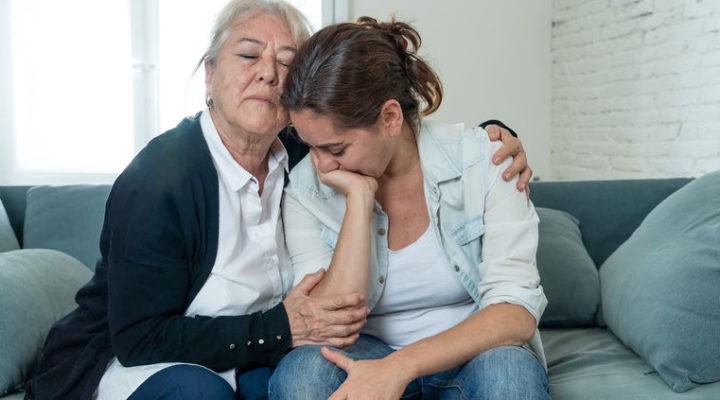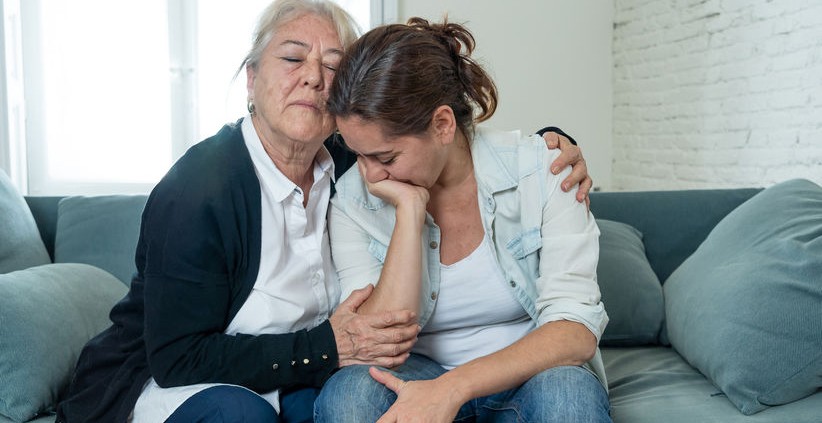So much comes into my mind and heart when I talk or write about abortion. I have to revisit the time I miscarried at 3-plus months in 1979. After a week of hemorrhaging blood clots the size of liver slices, I had a dilation and curettage procedure, an abortion.
Up until that time, my blood test came back positive for pregnancy. My doctor was old-school, so when I asked her what had gone wrong in the pregnancy, she responded with very little information: “It didn’t develop properly.” I was too young and naïve to press for more specifics, so that’s all I know today.

Becky Ankeny
I was heartbroken at the time, having spent several months praying for this child and anticipating joy. It was not an emotion equally shared by my husband, who was kind and considerate, but for whom this had not yet become real. So I was lonely and sad.
When we were able to welcome our daughter a year and a half later, the sorrow of the miscarriage receded. Today I do not wish for that child to have come instead of, or even in addition to, the daughter I have today. I have conceded to the universe that the miscarriage was natural and, in my case, corrected a biological mistake. Not all miscarriages are like mine. They are complicated phenomena and more common than we know.
In comparison, my mother gave birth to a live daughter who required a blood transfusion and died either because of the Rh antibodies or the transfusion shock. Until she died at 95, my mother grieved that baby, whom she knew outside the womb for only a few hours. She saved the sympathy cards for seven decades, and she teared up nearly every time she spoke of the loss. She birthed me seven years later, and my blood transfusion went well, but I did not erase her sorrow.
When I hear the arguments against the right to legal abortion, I cannot separate my experience from the logic or the passion of those who would have restricted my right to end a pregnancy that was draining my life away and would have no happy outcome. I also know that those mothers whose pregnancies are nearer full term and who lose their babies either by nature or by medical intervention will live with tragedy for the rest of their lives.
“A mythology underlies the passionate opposition to abortion that would remove all legal access to it.”
A mythology underlies the passionate opposition to abortion that would remove all legal access to it. That mythology is that “everything happens for a reason” — including pregnancies in pre-teens or pregnancies as a result of rape or incest, including horrific medical problems with the unborn child making life impossible or severe conditions rendering pregnancy fatal to the mother. It does not do justice to the girls and women involved in these situations to require them to add to their tragedy guilt for choosing their own life over the unborn, or for refusing the responsibility of an infant whose existence was forced on them, or for finding impossible the burden of caring for a child who never can live without medical intervention. To require women to carry the child to term or die trying, to require them to birth a child they cannot care for, or a child who will never breathe independently or the many other devastating medical problems from genetic or developmental flaws is, simply speaking, unkind.
Each woman is responsible to God and herself for the way she lives in her body. The implications of pregnancy are unique to each woman. The decisions she makes about pregnancy are hers and are hers to share if she is in a loving and stable relationship. These decisions do not belong to the government; indeed, if the government removes the right to a legal abortion, the result for women is a kind of slavery.
“The belief that all life is sacred, and that this includes the unborn, is one I share.”
The belief that all life is sacred, and that this includes the unborn, is one I share. Even so, believing life is sacred is not equivalent to believing life should be preserved at all costs.
Every day, we behave in ways that remove from others the means of life. We indulge ourselves at the table while others starve, for just one example. We are uncomfortable with the idea of sacrificing one life for another, and yet we in technologically wealthy countries will hang on to life for a cost that would save hundreds in impoverished circumstances. We feel obliged to do so by this belief that life is sacred, but we are hampered in applying it fully to others by the limits of our immediate experience.
We behave as if some lives are more sacred than others. Then we justify ourselves by blaming those who refuse to make the impossible sacrifice of their own lives.
We also need to believe that every death is also sacred, indeed precious, in the eyes of God. We need to reflect that every soul is present to God and God is present to that soul. To us, death is often tragic, but God is present in that experience as well as in the moments of conception and birth.
We understand little about any of these experiences, and we need therefore to have personal humility before them and kindness for those going through them.
Becky Ankeny lives in Newberg, Ore., and is a former professor at George Fox University. She is a Quaker and previously served as general superintendent of the Northwest Yearly Meeting of Friends. Her parents were Friends missionaries in Burundi, Africa, for three decades, and she spent much of her first 15 years there. She graduated from George Fox College in 1977 and received an MBA and Ph.D. in English from the University of Oregon. Her Ph.D. work was on the fiction of George MacDonald, a Victorian preacher and writer who influenced C.S. Lewis. She taught at Westmont College from 1986 to 1988 before returning to her alma mater, George Fox, to work as a professor of English and as an administrator from 1988 to 2011.
Related articles:
Can Christians come together to reduce the need for abortion? | Susan Shaw
50 years later, abortion remains a political smokescreen | Dwight Moody


